
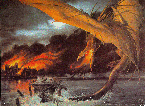 This
is a picture of the destruction of Lake-Town in chapter 14, Fire and
Water. This is the chapter in which Smaug is killed and also has the
beginning of the Battle of the Five Armies. Chapter 14 ends with the armies
of the Wood Elves and the Lake Men gathering to march on the Lonely Mountain.
The armies that made up the Battle of the Five Armies were Men, Wood Elves,
Dwarves, Orcs and Eagles.
This
is a picture of the destruction of Lake-Town in chapter 14, Fire and
Water. This is the chapter in which Smaug is killed and also has the
beginning of the Battle of the Five Armies. Chapter 14 ends with the armies
of the Wood Elves and the Lake Men gathering to march on the Lonely Mountain.
The armies that made up the Battle of the Five Armies were Men, Wood Elves,
Dwarves, Orcs and Eagles.
This was a strange battle, as the Men and Elves, were at first prepared to make war on the Dwarves to get the treasure. Afterwards, with the coming of the Goblins, the Men, Elves and Dwarves allied together to fight the goblins. They still likely would have lost if it were not for the Eagles coming.
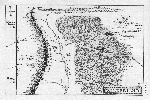
The map of Mirkwood, as it came to be known after the Necromancer took up residence at Dol-Guildur. Before then it was called Greenwood the Great, in Elvish, Eryn Galen, and after the Ring was destroyed it was named Eryn Lasgalen, The Wood of Green Leaves. This picture is from The Hobbit, the HarperCollins edition last page.
Within Mirkwood was an enchanted stream. Anyone who touched or drank of this stream fell into an enchantment of sleep. Most of the creatures of Mirkwood were black, though there were white deer. Some of the most horrible creatures of Mirkwood were the Giant Spiders.
There are two versions of the Hobbit, one of which has Gollum going to give Bilbo the Ring. Tolkien ran into trouble with this when he was writing The Lord of the Rings. As the Ring was taking on a more and more sinister aspect, having Gollum give away the Ring was less and less possible. To fix this Tolkien rewrote parts of the Hobbit to suit the Lord of the Rings. The way he explains this in the Lord of the Rings is that Bilbo wrote the original version of the Hobbit as the Ring was taking effect, and when Frodo rewrote the Red Book of Westmarch he was unwilling to remove what Bilbo had put, so there were some copies made of the original.
 The much loved Rivendell, described by Bilbo, as:
The much loved Rivendell, described by Bilbo, as:
His house was perfect whether you liked food, or sleep,
or work, or story-telling, or singing, or just sitting and thinking best,
or a pleasant mixture of them all. Evil things did not come into that
valley.
From The Hobbit, Page 58, chapter, A Short Rest.
Later in The Lord of the Rings page 1023, Sam said
Well, Mister Frodo, we've been far and seen a deal, and
yet I don't think we've found a better place than this. There's something
of the Shire and the Golden Wood and Gondor and kings' houses and inns
and mountains all mixed.
Rivendell was also Aragorn's choice of residence as he told Eowyn in the Lord of the Rings..
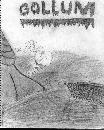 This is a picture of Gollum that I did about four or five years ago. It
is based on the pictures of Gollum in the Rankin-Bass illustrated version
of the Hobbit. In the Lord of the Rings, Gollum was shown to be a hobbit
from the days when they lived by the side of the Anduin River, near the
Gladden Fields. If it were not for Gollum, the Quest of the Ring would
have failed. Gollum's real name was Smeagol. He followed the Company of
the Ring from Moria all the way down the Anduin. After the breaking of
the Fellowship, Frodo and Sam caught Gollum on the borders of the Emyn
Muil and forced him to guide them to Mordor. Before this time, Gollum
was seen as a pair of eyes in the Mines of Moria, then as a shape in the
tree in Lothlorien where they took refuge with the Elves and last of all
as a shape paddling down the Anduin River on a log.
This is a picture of Gollum that I did about four or five years ago. It
is based on the pictures of Gollum in the Rankin-Bass illustrated version
of the Hobbit. In the Lord of the Rings, Gollum was shown to be a hobbit
from the days when they lived by the side of the Anduin River, near the
Gladden Fields. If it were not for Gollum, the Quest of the Ring would
have failed. Gollum's real name was Smeagol. He followed the Company of
the Ring from Moria all the way down the Anduin. After the breaking of
the Fellowship, Frodo and Sam caught Gollum on the borders of the Emyn
Muil and forced him to guide them to Mordor. Before this time, Gollum
was seen as a pair of eyes in the Mines of Moria, then as a shape in the
tree in Lothlorien where they took refuge with the Elves and last of all
as a shape paddling down the Anduin River on a log.
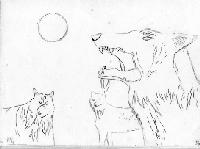 This
picture is another based on the Rankin-Bass illustrated version of the
Hobbit that I did about four or five years ago. The wargs were evil wolves
that were primarily found on the eastern side of the Misty Mountains.
From the surprise in Aragorn's voice when the Wargs attacked them on their
way to Moria, it was a rare thing for the Wargs to be found on the western
side of the Misty Mountains. The Lord of the Rings, page 314:
This
picture is another based on the Rankin-Bass illustrated version of the
Hobbit that I did about four or five years ago. The wargs were evil wolves
that were primarily found on the eastern side of the Misty Mountains.
From the surprise in Aragorn's voice when the Wargs attacked them on their
way to Moria, it was a rare thing for the Wargs to be found on the western
side of the Misty Mountains. The Lord of the Rings, page 314:
Suddenly Aragorn leapt to his feet. "How the wind howls!"
he cried. "It is howling with wolf voices. The Wargs have come west of
the Mountains!"
The Wargs were not at all like ordinary wolves in that they were more clever and evil than ordinary wolves and when killed, their bodies were often not to be found after. The Lord of the Rings, pages 316-317:
When the full light of morning came no signs of the wolves were to
be found, and they looked in vain for the bodies of the dead. No trace
of the fight remained but the charred trees and the arrows of Legolas
lying on the hilltop. All were undamaged save one of which only the point
was left.
"It is as I feared," said Gandalf. "These were no ordinary wolves hunting
for food in the wilderness. Let us eat quickly and go!"
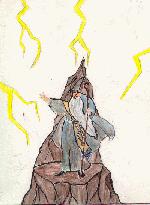 This
is a picture that I started from the Rankin-Bass version of the Hobbit
about four or five years ago, then added to. What I added was my impression
of the aftermath of Gandalf's fight with the Balrog on Zirak-Zigil or
the Silvertine. Gandalf had many names (pages 696-697 of The Lord of the
Rings):
This
is a picture that I started from the Rankin-Bass version of the Hobbit
about four or five years ago, then added to. What I added was my impression
of the aftermath of Gandalf's fight with the Balrog on Zirak-Zigil or
the Silvertine. Gandalf had many names (pages 696-697 of The Lord of the
Rings):
Many are my names in many countries, he said. Mithrandir
among the Elves, Tharkun to the Dwarves; Olorin I was in my youth in the
West that is forgotten, in the South, Incanus, in the North, Gandalf;
to the East I go not.
In the Lord of the Rings, Gandalf the Grey passed through death to become Gandalf the White.
Though The Hobbit was meant as more of a children's tale, Gandalf shows signs of the power he shows in The Lord of the Rings, examples being, when rescuing the dwarves from the goblins, and during the Battle of the Five Armies.
The BBC Radio Play version of the Hobbit
The radio play version of the Hobbit by the BBC seems consist of 8 episodes. It has very good sound effects especially with the goblins in the chapter Over Hill and Under Hill, with signature sounds for the main characters such as Gandalf. Some sound clips from the radio play (I think) are at this page: Quotes and sound clips from The Hobbit.
Unlike the movie, the radio play does not seem to skip anything important, such as Beorn and at many times is almost word for word as the book or very close to it.
The voice of Smaug is very convincing and the actor that played Bilbo did a very convincing job in that scene. This is very well done. Smaug's voice sounds like grumbling thunder.

